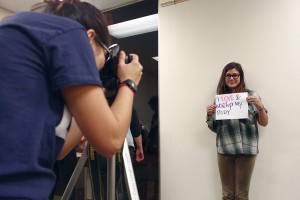WSA launches Body Love Week at USC
On Monday, the USC Women’s Student Assembly began celebrating Body Love Week, a series of events promoting the reconceptualization of beauty and healthy body image.

Love yourself · After receiving a henna tattoo, senior Mellissa Villafranco poses for a photo on Monday during Body Love Week. – Jessca Zhou | Daily Trojan
WSA Co-Director Kaya Masler said she was excited to integrate the program into the assembly.
“We’ve celebrated Body Love Week before, but this is our first full week of programming,” Masler said. “We heightened the initiative after taking the temperature on campus and responding to a lot of the really unhealthy, body-negative comments that we were hearing. It’s something almost no woman doesn’t deal with.”
Events began Monday with a kickoff celebration involving henna, body decorations and a photo campaign. The director of Body Love Week, Jasmine Aguilar, was largely inspired by similar movements she found while doing research on other events meant to promote healthy self-image.
“In the Boulder Youth Body Alliance, they wrote messages about their body somewhere on their body,” Aguilar said. “[Some] were really funny like, ‘My heart is bigger than my butt,’ or they had really serious ones that said, ‘I’m sorry for every time I said I hated you,’ or ‘I am really proud of what my body can do rather than how it looks. I really want to spread those kinds of messages across campus as much as I can.”
The events attempt to counter beauty ideals deeply embedded within society, which Aguilar said can affect virtually everyone.
“We’re all held up to a specific ideal of what beauty is, Aguilar said. “For or a lot of what I’ve seen it’s very heteronormative; it’s very ‘blonde hair, blue eyes, skinny,’ [and] for men it’s ‘muscular.’ So I just want to explore, and help others explore, other ideas of what beauty means.”
Some students said they believe these norms have become embedded in society.
“Almost every political, social, economic structure favors white, cisgendered, straight people, whether it’s women or men, so if you don’t fall into that category then you might have issues with yourself,” Lena Melillo, a freshman majoring in philosophy, politics and law, said. “Colonialism is what instituted those values in the first place, so even if media is the vehicle that presents them, it’s not necessarily the media’s fault.”
Melillo said she believes larger social problems can also contribute to widespread body negativity.
“Things like racism are really bad for body image. Not just in the United States, but in many countries, lighter skin is seen as more beautiful,” she said.
The Body Love movement started on a global scale, from outrage at size discrimination in the fashion industry.
“There have been a lot of companies in recent light that refuse to sell clothes for women who are above a size large, or above a size 8, or don’t sell any sort of plus sizes,” Aguilar said. “So a lot of them have been bringing a lot of attention to size and what it means to be a fat woman, and a fat man as well, in society and looking deeper into that.”
Since then, the movement has spanned several campaigns similar to, perhaps most famously, the Dove Campaign for Real Beauty. Despite the publicity of the Dove campaign and other mainstream movements, Aguilar said Body Love at USC will be more inclusive.
“Dove does a lot of diversity in women, specifically in weight. I wanted to expand on body diversity more than in terms of just size; I wanted to expand on able-bodied, I wanted to expand on race and gender, and everything in between in terms of intersectionality,” she said. “I wanted it all across the board as much as I possibly could in four days.”
The week’s events range from a documentary screening about lesbian, gay, bisexual and transgender people of color who are disabled, called Sins Invalid, to a “BDSM: Fact and Fiction” workshop in partnership with the Queer and Ally Student Assembly.
For Aguilar, her involvement in the Body Love movement came out of personal struggles with her own self-image.
“Since I was in middle school, I’ve had an eating disorder, so coming here to USC it was difficult to find a group, or a group of people, or a group of friends that I could disclose that to,” she said. “I felt really alone in the fact that I hated my body and the fact that I was different from everyone else I’d come into contact with. Everyone else seemed so confident.”
Aguilar said she hopes Body Love Week will reach out to those who might be feeling similarly uncomfortable with their bodies.
“I think it’s really easy to say that everyone else around you is beautiful and to appreciate everyone else’s body, but when it comes to yourself, we are told that we have to be harsher on ourselves,” she said. “So I really want everyone to see themselves in a more positive light.”
Melillo agreed that a negative body image has serious implications, both for individuals and society as a whole.
“If you have positive body image, then you’re more confident, and you’re able to better communicate your ideas to people,” she said. “If you’re feeling self-conscious, you’re inside of your head and you’re less likely to be able to communicate with people in meaningful ways.”
Follow us on Twitter @dailytrojan

take heavy girls serious!
This is a fabulous program and I am so glad it has finally come to SC!